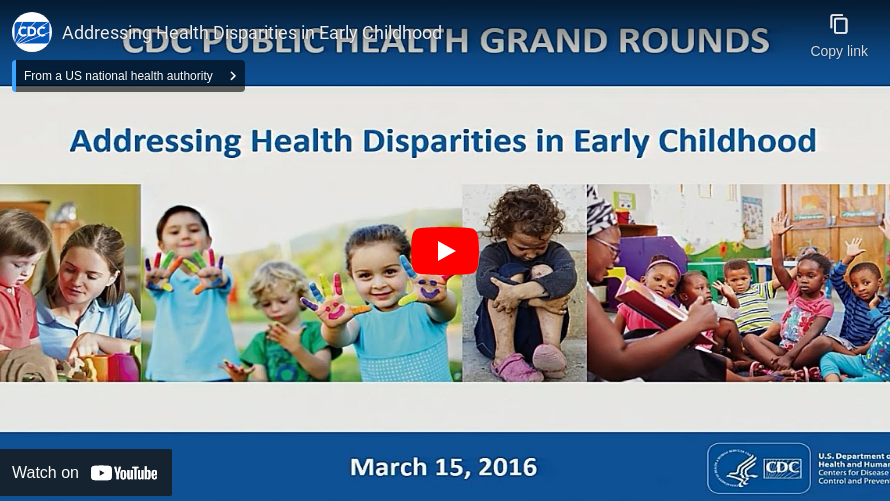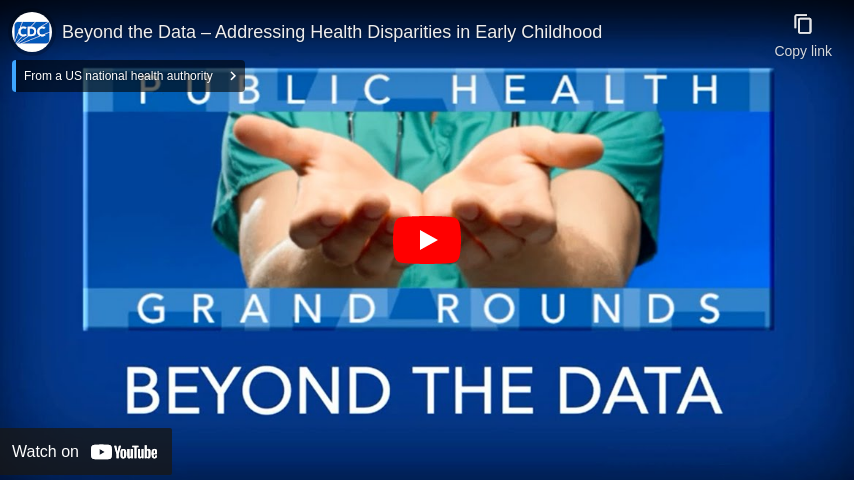Addressing Health Disparities in Early Childhood
Presented on .
The first years of a child’s life are some of the most important in terms of cognitive, social, and physical development. Early experiences occurring when a child’s brain and behavior are being shaped affect a child’s ability to learn, to get along with others, and to develop an overall state of well-being. Unfortunately, not all children have the same positive experiences or opportunities, which can lead to disparities. Social, economic, and environmental factors have been closely linked to health disparities.
Research suggests that many disparities in overall health and well-being are rooted in early childhood. For example, those who lived in poverty as young children are more at-risk for leading causes of illness and death, and are more likely to experience poor quality of life. This growing problem costs the United States billions of dollars annually. Our understanding of the lasting value of early experiences continues to grow. Interventions that support healthy development in early childhood reduce disparities, have lifelong positive impacts, and are prudent investments. Addressing these disparities effectively offers opportunities to help children, and benefits our society as a whole.
This session of Grand Rounds discusses how, together, we can address health disparities in early childhood through increased collaborations, public health partnerships, and early intervention.
In this session of Beyond the Data, Dr. Phoebe Thorpe and Dr. Ross Thompson discuss the positive impact of early childhood education and community intervention on young children’s health and well-being. Tune in to see how some programs, like ZERO TO THREE, are making it easier for families of young children to receive the care that they need.
- ZERO TO THREENational Center for Infants, Toddlers, and Families
- Learn the Signs. Act Early.Resources to help parents and caregivers identify developmental milestones
- Info About KidsResources and science-based information for healthy development
- Motor Delay ToolA tool to help parents identify delays in physical development
- Legacy for Children®Group-based intervention to encourage positive parenting and parent-child relationships
- Parent PortalResources for parents of children of all ages
- Positive Parenting TipsTips and for positive parenting, and child safety and health
- Essentials for Parenting Toddlers and PreschoolersResources and tips for parents of toddlers and preschoolers
- Ross A. Thompson, PhD
- Distinguished Professor of Psychology
Board President, Zero to Three
University of California at Davis
- Paul H. Dworkin, MD
- Executive Vice President, Community Child Health;
Founding Director, Help Me Grow National Center,
Connecticut Children's Medical Center;
Professor of Pediatrics, University of Connecticut School of Medicine
Connecticut Children's Medical Center
- Georgina Peacock, MD, MPH
- Director, Division of Human Development and Disability
National Center on Birth Defects and Developmental Disabilities, CDC
- Mary Ann McCabe, PhD, ABPP
- Associate Clinical Professor of Pediatrics
George Washington University School of Medicine
- John Iskander, MD, MPH
- Scientific Director
- Phoebe Thorpe, MD, MPH
- Deputy Scientific Director
- Susan Laird, MSN, RN
- Communications Director
Get notified about the latest updates from Public Health Grand Rounds right in your inbox by setting up an alert today!
Get notified about the latest updates from Public Health Grand Rounds right in your inbox by setting up an alert today!Sign Up
Get notified about the latest updates from Public Health Grand Rounds right in your inbox by setting up an alert today!
- Presentation Slide Deck [5 MB, 90 Pages, HTML]
- Help Me Grow National Center
Advancing Developmental Promotion, Early Detection and Linkage to Services - Caring for Children in a Disaster
Resources for planning and preparedness - Early Hearing Detection and Intervention (EHDI)
Resources for identifying and getting services for children with hearing loss - Healthy Steps
Pediatric-based program for extending services to vulnerable young children and their families - MMWR
Health Care, Family, and Community Factors Associated with Mental, Behavioral, and Developmental Disorders in Early Childhood — United States, 2011–2012 - The Science of Early Childhood Development 15 Years After Neurons to Neighborhoods [613 KB, 7 Pages]
CDC Course Code: PHGR10
CPE UAN: 0387-0000-16-003-H04-P
For more information, see Grand Rounds Continuing Education.

More than 4 million newborns in the US are screened yearly for hearing loss and certain disorders. Learn how newborn screening provides an opportunity for reductions in morbidity and mortality while reducing health care costs associated with treatment of lifelong debilitating conditions.

Preterm birth is a challenge. Its causes are numerous and poorly understood. Modern technology and stronger public health strategies have made a significant impact in reducing preterm births and infant mortality. Find out how improvement efforts can reduce preterm births, especially among racial and ethnic minorities.


